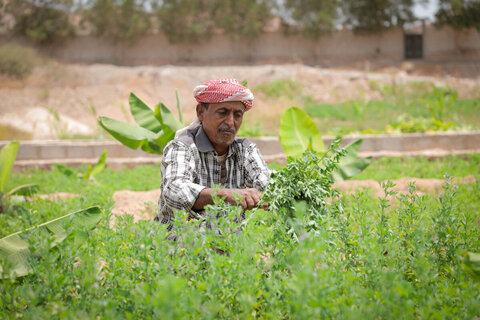Yemen: Final call

[Updated on 15/11/18]
The warning from WFP is stark: "The violence must stop now to give Yemen a chance to pull back from the brink. Unless it does, this will become a country of living ghosts, its people reduced to sacks of bones."
"Humanitarians can only do so much in the face of relentless bombing and unconscionable war tactics that spare no one," the agency added as its Executive Director returned from a visit to the war-torn country this week.
Over three years of conflict, economic collapse, rising prices and a shattered supply and distribution chain are pushing more and more Yemenis into hunger.
The number of people classified as in an ‘emergency' situation — one step below famine in the internationally-recognized Integrated Phase Classification (IPC) scale — currently stands at just under 8 million. However, a new assessment due to be released later this month is expected to show emergency figures spiralling to cover up to half of Yemen's population.
Nearly two million children are acutely malnourished, which makes them more vulnerable to disease. In hospitals across the country, malnourished children can barely gather the strength to breathe. Unless urgent action is taken, a whole generation is at risk.

In anticipation of the rise in hunger being confirmed, WFP stands ready to expand its operations as needed.
WFP needs safe, immediate and unimpeded access to bring in food and other vital supplies to save lives. Intense fighting in and around the port city of Hodeidah — through which 70 percent of the country's imports transit — has caused major delays in the arrival of humanitarian and commercial cargo. As a result, the price of food in shops has shot up beyond the reach of many people.
During his visit to Hodeidah, WFP's Executive Director, David Beasley, called on all sides to the conflict to respect the port. "Hodeidah is the lifeline of Yemen. It must be protected so that we can get the cargo, the food and the fuel in and out to allow people to survive," Beasley said.
WFP is also joining calls for emergency measures, by Yemen's Central Bank and in partnership with international financial institutions such as the International Monetary Fund, to stabilize prices. Three out of four Yemenis cannot afford the basics of life.

Government employee and father-of-three Walid is one of them. He and his family cannot afford rent or much food and have to rely on the kindness of others — the landlord allowing them to live in the flat for free, the neighbours who bring them bread in the morning — as well as WFP assistance. "If I come home late from work and find the children sleeping, I say to myself ‘let them sleep until the morning'. I never wake them up. If I woke them up, they would say they wanted to eat dinner," he says.
His words sum up the situation of over 1.2 million public servants who have not received their salaries for more than two years. For them, and millions of others in Yemen, the clock has almost stopped ticking.


